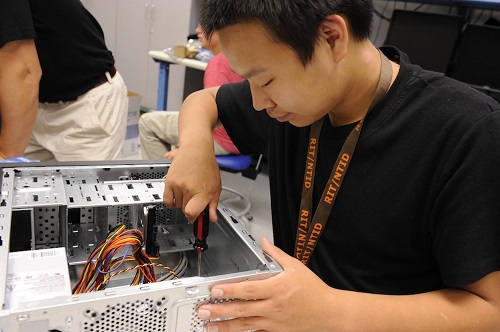Students make their own computers to take home, even if they live near the Arctic Circle.
There may not be any roads in John Smart’s village of Napakiak, Alaska, but they have electricity there.
And Smart, 15, a Yupi’k Eskimo, plans to use some of it for his new computer he built at the recent TechBoyz summer camp at Rochester Institute of Technology’s National Technical Institute for the Deaf.
He was one of 35 deaf and hard-of-hearing boys and girls from around the country who attended the recent six-day TechBoyz and TechGirlz technology camps at RIT/NTID this year. The goal is to encourage 7th-, 8th- and 9th-graders to pursue their interest in science, technology, engineering and math.

John Smart, 15, builds a computer he’ll take home to Alaska during TechBoyz camp at RIT/NTID. Photo courtesy of Mark Benjamin, RIT/NTID.
Just traveling from Napakiak – population 369 – more than 3,500 miles to attend TechBoyz was an adventure for Smart. He had to take a boat to Bethel, Alaska, then a small plane to Anchorage, where he boarded a jet to Portland, Ore., another to Chicago, and another to Rochester, N.Y.
“I like it. I’m really enjoying it,” Smart said of his taste of college as he got ready to download software into his new computer. “I want to become an engineer and I like the hands-on part of it. And I’m meeting new friends and learning their cultures.”
His family had a computer, but it broke several years ago and has not been replaced until now.
“It's gratifying each year to see so many young deaf and hard-of-hearing students enthused about technology, and thinking about ways they can involve technology in their careers,” said Mark Sommer, senior director of NTID's Outreach Consortium. “And John’s adventure getting to Rochester shows what lengths they'll take to come to RIT/NTID.”
Other than building computers, the campers attended a robotics lab, competed in math challenges, enjoyed programs at the Rochester Museum & Science Center, visited an amusement park and went bowling. They were also taught how to avoid phishing scams and identity theft.
Many of the students were able to attend the camp with the help of scholarships from the J.M. McDonald Foundation, Quota Club International and the NTID Alumni Association.
Cameron Carey, 14, of Carlisle, Pa., plans to become a computer software developer or technician. “TechBoyz pushed me to reach my goal,” he said. “It’s been lots of fun.”
Sophia Kouassi, 14, of Douglasville, Ga., learned about TechGirlz after her teacher gave her information about the camp. “I never thought I could build my own computer,” she said. She’s considering a career in the culinary or music field, or as a lawyer. Either way, a new computer will help. “It’s a good tool to have.”
Several of the students said they hope to attend RIT/NTID, which, with more than 120 sign language interpreters, more than 50 classroom captionists and hundreds of notetakers, is the most accessible college campus for deaf and hard-of-hearing students.
One of nine colleges of RIT, NTID was established by Congress in 1965 to provide college opportunities for deaf and hard-of-hearing individuals who were underemployed in technical fields. More than 1,250 deaf and hard-of-hearing students from across the country and beyond attended RIT/NTID last year, making it the largest college for deaf and hard-of-hearing undergraduates in the country.

